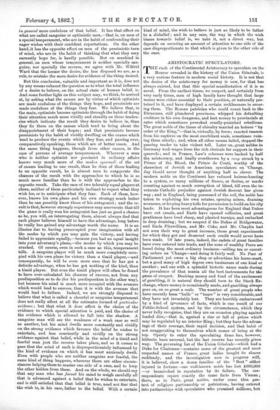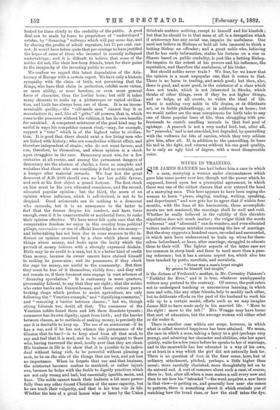ARISTOCRATIC SPECULATORS.
THE rush of the Continental Aristocracy to speculate on the Bourse revealed in the history of the Union Generale, is a very curious feature in modern social history. It is not that the desire of the aristocracy for money is new, for that has always existed, but that this special manifestation of it is so novel. From the earliest times, we suspect, and certainly from very early times, men of high family have thought that large means were either essential to their position, or naturally per- tained to it, and have displayed a certain recklessness in secur- ing them. The Roman patrician who could count back to the Etruscans, still plundered provinces, whipped his defaulting creditors in his own dungeons, and lent money to provincials at rates which sometimes provoked cruelly-punished rebellions. The great noble of the times of chivalry married an heiress "by order of the King,"—that is, virtually, by force; exacted ransom from his captives on the most exorbitant scale, sometimes ruin- ing them utterly ; and, when all other means failed, stopped the passing trader to take violent toll. Later on, great nobles in Germany took wages from the rich clericals for support in their quarrels ; and in France, Law's schemes were backed by half the aristocracy, and finally overthrown by a coup struck by a Prince of the Blood, the Prince de Conti, worthy of the shrewdest of Jewish or American speculators on 'Change. Jay Gould never thought of anything half so clever. The modern noble on the Continent has reduced heiress-hunting to a system, so many millions of francs, or florins, or marks counting against so mach corruption of blood, till even the in- veterate Catholic prejudice against Jewish descent has given way ; and in England, being possessed of the soil, the noble has taken to exploiting his own estates, opening mines, draining morasses, or levying heavy tolls for permission to build on his city lands. It has been most advantageous for England that Dukes have cut canals, and Earls have opened collieries, and great gentlemen have bred sheep, and planted turnips, and embarked in deep draining; but we suspect if the Dukes of Bridgewater, and Earls Fitzwilliam, and Mr. Coke, and Mr. Chaplin had not seen their way to great incomes, those great experiments for which they got and deserved such credit would never have been made. Of late years, indeed, the cadets of great families have even entered into trade, and the sons of wealthy Peers are found doing the most ordinary business—selling tea or execut- ing orders on 'Change—and doing it fairly well. No Peer of Parliament yet owns a big shop or advertises his horse-mart, but a good many of high degree own businesses of one kind or another; and one with a splendid historic name made during the prevalence of that mania all the best instruments for the game of croquet. Desiring money and fond of the excitement of gambling, it is natural they should turn to the Stock Ex- change, where money is occasionally made, and gambling always goes on, on BO great a scale. The number of great people who have recently been "bulls" or "bears" is very considerable, and they have not invariably lost. They are horribly embarrassed by a kind of ignorance of facts, which is one result of our Public-School system, and by the circumstance, which they never fully recognise, that they are on occasion playing against loaded dice,—that is, against a rise or fall of prices which may be regulated by an interior Ring ; but they have the advan- tage of their courage, their rapid decision, and that habit of not exaggerating to themselves which comes of being at the
top. Openly to enter the speculating firms has, however, hitherto been unusual, but the last reserve has recently given way. The governing list of the Union Generale—which had a. Duke for Chairman—contains some of the greatest and most respected names of France, great ladies bought its shares recklessly, and the investigation now in progress will, it is believed, show a dozen families of the " Best " either injured in fortune—one well-known noble has lost £680,000 —or besmirched in reputation by its failure. The cor- respondents report exactly the same facts from Vienna ; there, as in Paris, great nobles, under some thin pre- text of religious partisanship or patriotism, having entered into partnerships with speculators who promised millions, but looked for them chiefly to the credulity of the public. A good deal can be made by loans to proprietors of " undeveloped " estates, by " financing " railways which will pay some day, and by sharing the profits of adroit regraters, but 75 per cent. can- not. It would have taken quite that per-centage to have justified the hopes of some of those who invested in recently collapsed undertakings ; and it is difficult to believe that some of the nobles did not, like their low-born friends, trust for their gains to the incapacity of the investing public to count.
We confess we regard this latest degradation of the Aris- tocracy of Europe with a certain regret. We have only a historic sympathy with the claim of birth, not perceiving that the Kings, who have that claim in perfection, exhibit more virtue, or more ability, or more heroism, or even more general force of character, than the lowlier born ; but still it takes many elements to make up a picturesque or varied civilisa- tion, and birth has always been one of them. It is an incom- municable quality,—the "self-made man" cannot buy it or manufacture it ; and, like all "gifts," all powers, that is, which come to the possessor without his volition, it has its own benefits for mankind. A competent aristocrat of the good kind may be useful in ways his competitor cannot rival,—may, for example, support a " tone " which is of the highest value to civilisa- tion. It is good that there should exist a few living men who are linked with history ; who are somebodies without effort, and therefore independent of strain ; who do not want favour, and can, therefore, be themselves, and whose opinion is a check upon strugglers in the race. Democracy must win, for a few centuries at all events, and among the permanent dangers of democracy are the absence of checks, a force so complete and resistless that those who can conciliate it feel no restraint, and a hunger after material rewards. We • fear lest the great democrat of A.D. 2000 should own no law but public favour, and seek as his first object a grand fortune. The first check on him must be his own educated conscience, and the second, educated popular opinion ; but the third, the scorn of an opinion whose influence, which is self-derived, is not to be despised. Good aristocrats can do nothing to a democrat who succeeds, but it is an annoyance to the latter to feel that the former despise his conduct, and have force enough, even if it be unaccountable or accidental force, to make their opinion effective. We have never felt quite sure that the comparative freedom we enjoy in this country from political pillage, concussion— or use of official knowledge to win money— and bribe-taking has not been due in some measure to the in- fluence on opinion exercised by a class which places many things above money, and looks upon the laxity which the pursuit of money induces with a strongly expressed disdain. Birth may be no credit to a man, but it is a better kind of credit than money, because its owner cannot have stained himself in seeking its possession; and its possessors, if they cheek the rage for money, are useful to the community. But then they must be free of it themselves, visibly free ; and they will not remain so, if their foremost men engage in vast schemes of "financing speculation." It is customary in some quarters, presumably Liberal, to say that they are right ; that the nobles who enter banks and finance-houses, and those curious pawn- broking shops which profess to assist agriculture, are only following the "Venetian example," and "dignifying commerce," and "removing a barrier between classes ; " but we, though strong Liberals too, doubt all that. The commerce of the Venetian nobles found them and left them dissolute tyrants ; commerce has its own dignity, apart from birth ; and the barrier between classes, as to methods of making money, is precisely the one it is desirable to keep up. The use of an aristoccrat—if he has a use, and if he has not, whence the permanence of the illusion that he has P—is to keep aloof from all that mud, to say and feel that it is mud, and to be coldly arrogant to those who, having traversed the mud, loudly aver that they are clean. His business in life is to show that it is possible to be indivi- dual without being rich, to be powerful without pleasing a mob, to be on the side of the things that are best, and yet lose no importance. When he forgets that use and that business, the aristocrat becomes useless to mankind, or rather injuri- ous, because he helps with the feeble to dignify practices which - are not only wrong and bad, but essentially ignoble, mean, and base. The noble cannot teach their badness a bit more power- fully than any other decent Christian of the same capacity, but iie can teach their vulgarity, and that is his true role in life.
• Whether the heir of a great house wins or loses by the Union Generale matters nothing, except to himself and hia kinsfolk ; but that he should be in that mess at all is a derogation which if aristocracy has any social use, impairs its usefulness. One need not believe in Bishops or hold all bets immoral to think a betting Bishop an offender; and a great noble who, believing that he has early information, stakes his fortune on a rise in Shares based on public credulity, is just like a betting Bishop. He impairs to the extent of his powers and his influence, the reputation, and therefore the usefulness, of his Order.
But should nobles never trade P We fear, for we know that the opinion is a most unpopular one, that it comes to that. There is no harm in trading, and much good; but then, also, there is good, and more good, in the existence of a class.which does not trade, which is not interested. in Stocks, which thinks of other things, even if they be not higher things, and so helps, at all events, to widen the ideal of life. There is . nothing very noble in tile drains, or in dilettante art, or in feeble philanthropy, or in soldiering at home ; but we would rather see the man conspicuous for birth take to any one of those popular lines of life, than struggling with pro- fessionals to snatch smelling morsels in that foul pool of agiotage. A peacock is not a very useful bird, but, after all, he "peacocks," and is not ennobled, but degraded, by quarrelling with the vultures for bits of carrion, which they very seldom give him, after all. If, in addition to the quarre]ling, he loses his tail in the fight, and returns without his one good quality, he is only an ugly bird of degree, with a most disagreeable voice.



































 Previous page
Previous page